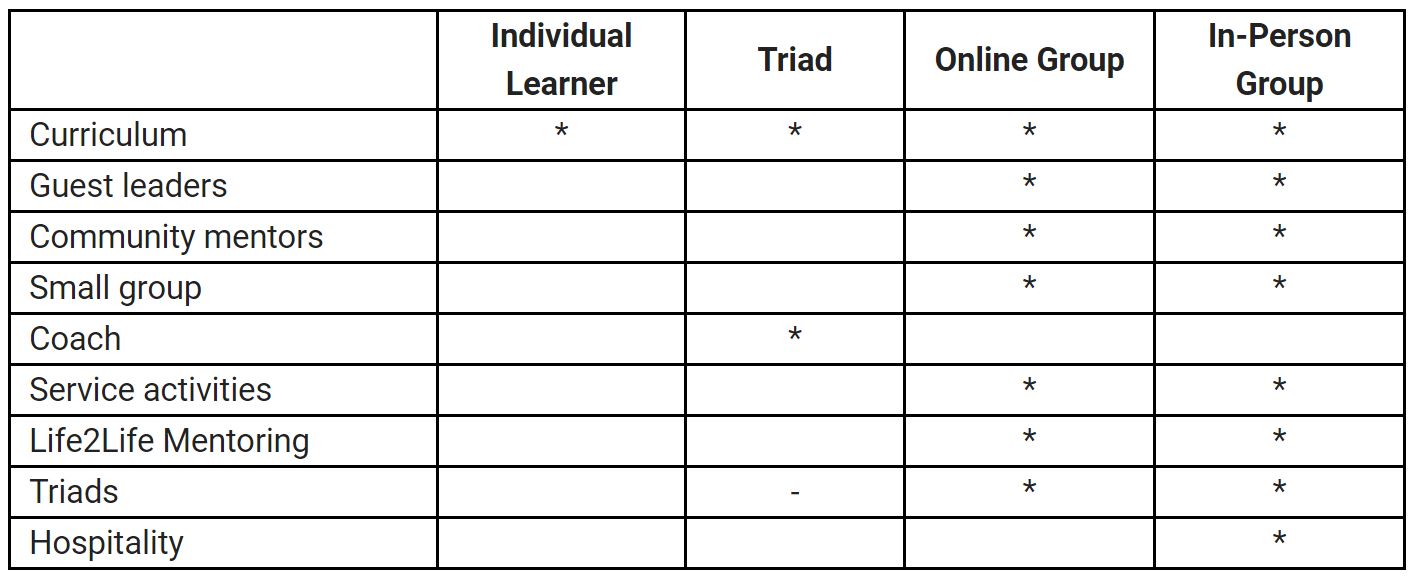Connect • Influence • Achieve • For the Kingdom!
GROUPS
The Bible compares being on-mission for God to running a race or going on a journey. Journey Groups integrate small group discipleship best practices and biblical worldview with professional development best practices to help young adults grow not only spiritually and relationally, but also professionally. The objective is not only to help them faithfully run the race now. We also equip them to be race-ready for influence and impact. Both In-Person and Online group options available. Groups are a blend of personal connection and relevant content.
Have you ever wondered how a Christian young adult can live on-mission in a calling as a redemptive influence for Christ in culture and in the workplace? Have you ever thought what it might look like to thrive in your career and in your spiritual journey?
Have you ever desired to have older Christians walking alongside you in the journey, equipping you to be race-ready and helping you move toward your goals? If so, then a Journey Group might be for you.
INVISIBLE PLACEHOLDER DO NOT DELETE
This one is a placeholder with special code so that all the boxes appear closed at first. If you delete this one then the first box will be displayed open by default.
How You'll Grow
Spiritually. You’ll develop a biblical worldview and gain confidence in integrating faith and work, understanding calling, navigating cultural hot topics and being on mission in order to thrive as redemptive influencers for Christ in the workplace and culture. You’ll receive training in leadership and professional skills to help you succeed in your career. You will also meet leaders from a wide range of occupations and “cultural mountains” who are rooting their identity in Christ and living out their faith in the workplace.
Professionally. Groups use a discussion format, utilizing videos, podcasts, articles, live guest leader conversational interviews, and studying scripture. The emphasis is on application and accountability for personal transformation. You develop your own small, incremental action step, and your group holds you accountable to accomplish it. See our topics page for some of the concepts we’ve explored (and new ones coming up.)
Relationally. The young adults in the group plan social, service and outreach activities. Near the end of a journey, some are given the opportunity to take a turn facilitating their group. We want to equip young adults to equip others, whether in small groups or one-on-on: we know they have the potential- and Christ calls us all to make disciples. To grow within a community, we have to connect. Learning communities are about connecting relationally, not just exploring topical content. Expect about half of the time in a session to be building relationships and connecting.
Who's There?
Groups consist of 8-15 people: young adults 20-35 years old, community mentors and frequent guest leaders. There are also opportunities for 1-on-1 mentoring outside the context of the meeting.
When's The Journey?
Groups meet weekly. (We call them “Journey Legs.”) Online groups are designed to last about 90minutes. In-Person groups, which typically meet in homes and include eating together, will run about two hours or so. Jump in at the beginning of any leg of the journey.
What’s the DNA of a Journey Group?
A Journey Small Group should be known for the following:
- Relational: Build community through honest, authentic life-to-life connection.
- Hospitable: Inviting and serving others in a context that is both gracious and truthful. Break bread together. Safe place to ask “Why?” and “So what?”
- Reproducible: Multiply groups. Expand the Kingdom. Develop co-leaders within. Optimally simple: “I can do this!”
- Missional: Action-oriented, Holy Spirit-dependent. Holistically integrating faith with all areas of life, including work, calling, culture-making.
- Transformational: maturing in love, lordship and literacy in Jesus through an intentional, examined, integrated life in the context of community.
- Biblical: rooted in God’s inspired, inerrant Word, because it is true and has the power to transform lives, starting with our own.
SOCIAL COVENANT: What are the expectations for group participation?
Big picture expectations for relating to one another in a group is to treat others as you want to be treated, to love one another as Christ has loved you. A social covenant like the one below provides good practical, specific expectations.
SOCIAL COVENANT
How we will treat each other
We will treat each other with dignity, integrity, respect, love, grace, patience, accountability, and humility. See 1 Peter 5:5, Ephesians 4
Attendance: Give priority to arriving on time to meetings. Message the group facilitator when going to be absent or late.
Growth mindset: Follow through on commitments so that I can grow into a person others can trust. I purpose to finish well and resist any urge to seek shortcuts or quit. I will be teachable and take ownership of my personal growth and development.
In order to reinforce the way we treat one another, we will encourage one another when we see them upholding the covenant. “See something, Say something.”
Share with others
To reinforce what I am learning and to invest in others, I commit to select two people with whom I will share the big idea of the session’s lesson or one thing that I learned. I will do this before the next session.”
What we will do when someone violates the agreement
Pre-forgiveness. Before approaching the person, we will have pre-forgiveness in our heart, not counting any wrong toward the person.
Kindness and timeliness. When the time is right, go to them in love (kindness.) Your first concern is the relationship, not the other person being wrong.
Humility. Approach with humility considering that you may be a part of the problem as well.
Truth. Speak with 100% truth, addressing the violation with complete communication of the situation.
6-Step Apology. Use the six-step apology to reconcile the situation.
- State the offense. “I did it…”
- Admit you were wrong. “I was wrong.”
- Apologize. “I am sorry.”
- Ask if they can forgive you. “Will you, or when you can, forgive me?”
- Ask for accountability. “I give you permission to hold me accountable.”
- Ask for anything else that may be there. “Is there anything else?”
We are committed to talk with someone, not about them. We will be confidential with each other’s testimonies and uphold everyone with respect as we journey together.
We will abide by the principles of Matthew 18:15-17 if someone doesn’t abide by the covenant for continued grievances. It says, “If your brother or sister sins, go and point out their fault, just between the two of you. If they listen to you, you have won them over. But if they will not listen, take one or two others along, so that ‘every matter may be established by the testimony of two or three witnesses.’ If they still refuse to listen, tell it to the church; and if they refuse to listen even to the church, treat them as you would a pagan or a tax collector.”
By joining this group, I am covenanting and committing to abide by and be held accountable to the behaviors that we as a group believe demonstrate the type of culture and community that will foster the best personal and professional development and success.
What’s the difference between groups and individual learners?
Individual Learners. These are folks who elect to use the curriculum resources on their own, at their own pace and not in community with others.
Triads. Triads consist of groups of three people using the curriculum and meeting regularly in-person or online. They may have a coach who checks in on them periodically to answer questions and offer encouragement. They aren’t connected to the larger Online or In-Person groups. On the other hand, Online Groups and In-Person Groups integrate a triad approach within the larger group to facilitate opportunity for deeper connection and accountability.
Online and In-Person Groups. They are just what you would have anticipated. Online groups aren’t geographically bound and meet online using whatever virtual video platform the group leader selected (Zoom, Google Meet, Skype, GoToMeeting, etc..) The meetings may tend to be a little shorter, depending upon people’s virtual meeting fatigue. In-Person groups are constrained to people’s willingness and availability to travel to the meeting. They often incorporate creating community around eating together, most frequently in a home. Meetings may last longer simply because people tend to linger, fellowshipping after a meeting. In-Person groups also better lend themselves to activity-based workshop-types of formats that are used from time to time to learn and practice content. Both groups limit involvement to 12-15 people: 2-3 community mentors, a facilitator, rotating guest leaders, and young adults.

Invest in Others, Invest in Yourself
Click button below then enter amount and pay.




